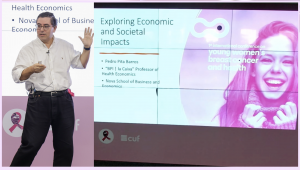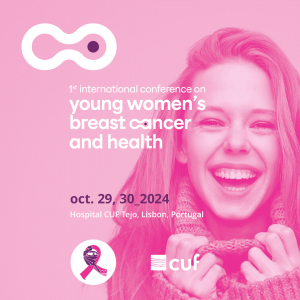
Advancing Health Equity for Young Women: Exploring the Economic and Social Impacts of Breast Cancer
BCYW Foundation: Exploring Health Equity and the Socioeconomic Impact of Breast Cancer in Young Women
DENVER, CO, UNITED STATES, December 6, 2024 /EINPresswire.com/ -- The recent International Conference on Young Women’s Breast Cancer and Health in Lisbon brought together experts, survivors, and advocates to discuss the critical issues affecting young women diagnosed with breast cancer, including understanding the impact of Breast Cancer in Young Women (BCYW) on health and societal economics - the focus of this press release.The discussion revealed a complex interplay of direct and indirect costs, employment impacts, and systemic disparities, providing a deeper insight into different components of society at the interface with young women with breast cancer.
SIGNIFICANT ECONOMIC AND SOCIAL COSTS
Breast cancer’s financial burden extends beyond immediate treatment costs, with long-term implications for individuals, families, and health systems. “Direct costs are usually considered these things like income and productive impact on families and careers,” noted Pedro Pita Barros, Ph.D., Professor of Health Economics at Nova School of Business of Economics, Lisbon, and a member of the European Commission’s expert panel on effective ways of investing in health. However, indirect costs—such as income loss, caregiving responsibilities, and emotional stress—have ripple effects across society, particularly in low-income and underinsured populations.
DISPARITIES IN ACCESS TO HEALTHCARE
Access to breast cancer care varies dramatically across countries and healthcare systems. While nations with universal health coverage, such as Portugal, ensure equitable treatment for all citizens, gaps persist in private insurance-based models. “They take lower coverage to save the premium pay, which means that when hit by this sort of cost, they may face financial hardship or not even have access to treatment,” explained by Prof. Barros. These disparities disproportionately affect low-income individuals and younger populations who may underestimate their health risks.
IMPACT ON EMPLOYMENT AND PRODUCTIVITY
Dr. Barros also examined the employment trajectories of women diagnosed with breast cancer over five years. Surprisingly, many women transitioned to higher-quality jobs post-diagnosis, a phenomenon attributed to a “composition effect.” Lower-paying, less stable jobs were more likely to be left behind, rather than active workplace discrimination or reduced capacity to work. “Women after five years post-diagnosis, on average, got a better job than before,” Professor Barros said while citing someone else’s work. It can sometimes provide an opportunity to reconsider and adjust career preferences compared to previous aspirations.
ROLE OF SCREENING AND EARLY DETECTION
Universal screening programs can improve survival rates but have financial and ethical challenges. Dr. Barros asked, “Should we just screen everyone or go for targeted screening? And if so, how do we identify those at higher risk?”
Targeted screening, informed by precise risk assessments, offers a cost-effective solution but requires sophisticated risk modeling and societal consensus. Balancing the costs and benefits of universal versus targeted screening remains a pressing challenge for policymakers.
POLICY AND SUPPORT PROGRAMS
Dr. Barros highlighted the critical role of public policy in addressing breast cancer’s far-reaching impacts. Examples include:
• Expanding universal health coverage to ensure equitable access to care.
• Supporting workforce reintegration through flexible job training and financial assistance programs.
• Prioritizing mental health resources, recognizing that “it’s not just the clinical part,” but emotional and social recovery.
• Implementing targeted screening programs to optimize resource allocation while minimizing over-diagnosis.
Workplace support is also essential. Employers could offer accommodations and benefits to help employees navigate treatment and recovery. These measures are “the right thing to do from an employer perspective” and vital for fostering resilience in the workforce.
LOOKING FORWARD
“This issue extends beyond medical aspects to require specific policies that support financial assistance, mental health, and family dynamics,” Dr. Barros emphasized. As breast cancer continues to impact lives globally, a concerted effort from policymakers, healthcare providers, and employers is crucial to address its wide-ranging effects.
ABOUT BCYW FOUNDATION
The Breast Cancer in Young Women Foundation (BCYW Foundation) is a global organization dedicated to advancing research, raising awareness, and providing support to young women affected by breast cancer. Through partnerships and advocacy, the foundation is committed to creating a future where no young woman feels overlooked in her fight against this disease.
Make A Donation: Every contribution – big or small – helps the BCYW Foundation fulfill its mission to save the lives of young women from breast cancer in the years to come. Thank you for your generosity.
Rakesh Kumar, Ph.D., Founder and CEO
Breast Cancer in Young Women Foundation
bcywf@breastcancerinyoungwomen.org
Visit us on social media:
Facebook
X
LinkedIn
Instagram
YouTube
Distribution channels: Culture, Society & Lifestyle, Education, Healthcare & Pharmaceuticals Industry, International Organizations, Social Media
Legal Disclaimer:
EIN Presswire provides this news content "as is" without warranty of any kind. We do not accept any responsibility or liability for the accuracy, content, images, videos, licenses, completeness, legality, or reliability of the information contained in this article. If you have any complaints or copyright issues related to this article, kindly contact the author above.
Submit your press release




